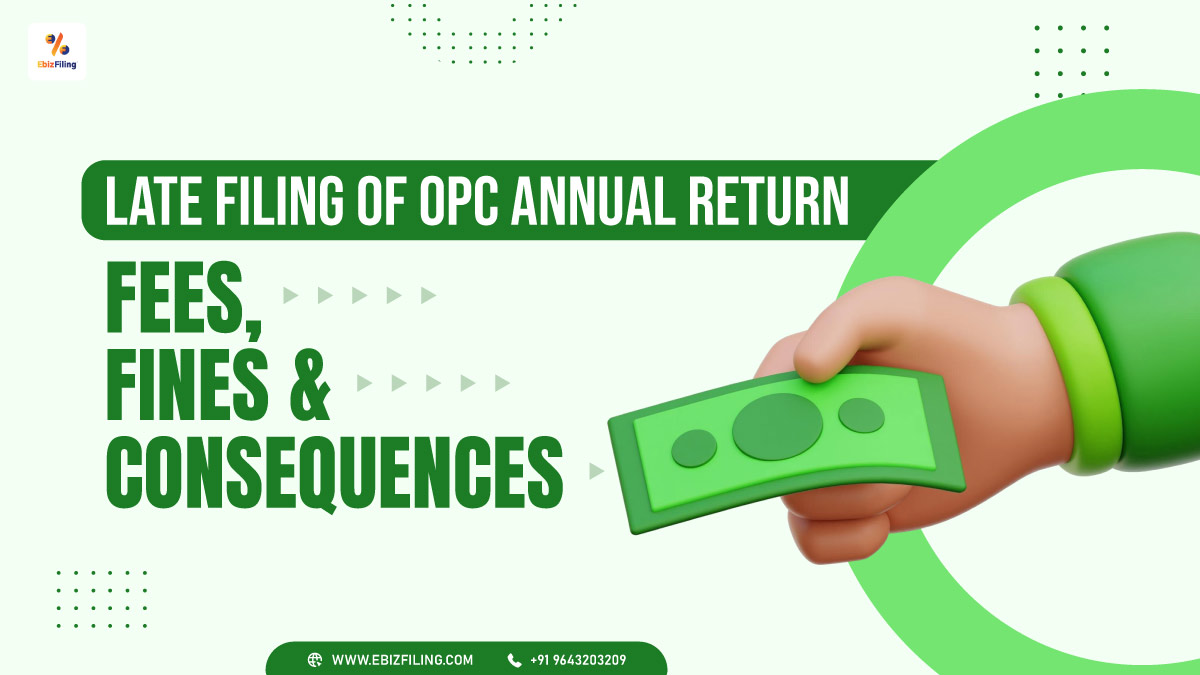
-
June 5, 2025
Penalties for Late of OPC Annual Filing
Introduction
Filing annual returns on time is mandatory for every One Person Company (OPC) in India under the Companies Act, 2013. Missing these deadlines leads to penalties and late fees imposed by the Ministry of Corporate Affairs (MCA). This blog explains the penalties for late filing and how OPCs can avoid them by staying compliant.
What is OPC Annual Return?
An OPC annual return is a yearly filing required under the Companies Act, 2013. It reflects the company’s financial health, ownership, and compliance status. The main forms involved are AOC-4 (for financial statements) and MGT-7A (for annual return). Timely filing of these ensures legal transparency and smooth operations for OPCs.
Key Forms for OPC Annual Return
- Form AOC-4 (Financial Statements Filing): This form includes the balance sheet, profit & loss statement, and audit report (if applicable). It must be filed within 180 days from the financial year’s end.
- Form MGT-7A (Annual Return Filing): Specifically designed for OPCs and small companies, it contains details about shareholding, management, and business operations. It must be filed within 60 days after six months from the end of the financial year.
Penalties for Late Filings
- ₹100 Per Day Late Fee: Both AOC-4 and MGT-7A attract a penalty of ₹100 per day for delay, with no upper limit. Delay in filing can quickly accumulate into a large fee.
- Penalty under Section 137 (AOC-4): ₹10,000 penalty for the company, plus ₹100 per day up to ₹10,00,000. Directors may be disqualified if the company fails to file for three consecutive years.
- Penalty under Section 92 (MGT-7A): ₹100 per day penalty for late filing of the annual return.
Consequences of Non-Compliance
- Extra Costs for Late Filing: ₹100/day late fee per form can turn into a heavy penalty for just a short delay.
- Fines for the Company and Directors: Companies can be fined up to ₹2,00,000 and directors up to ₹50,000, along with daily penalties.
- Director’s DIN Suspension: Continuous non-compliance can lead to disqualification of directors and suspension of their DIN.
- Company May Be Struck Off: MCA can strike off the OPC from the register for repeated non-filing.
- Damaged Reputation: Non-compliance affects credibility with banks, investors, and clients.
Why Timely Filing of Annual Returns Matters for OPCs
Timely filing of annual returns helps maintain the company’s legal standing and builds trust with stakeholders. It’s essential for securing funding, maintaining an active DIN, and avoiding “non-compliant” status on the MCA portal, which could lead to future legal issues.
How to Avoid Penalties?
- Track Filing Due Dates: AOC-4 must be filed within 180 days from the end of the financial year, while MGT-7A within 60 days after six months from year-end. Set reminders and alerts.
- Organize Company Records: Well-maintained records make it easier to prepare returns and ensure timely filing.
- File in Advance: Avoid last-minute rush by filing before the deadline. This leaves room for corrections if needed.
- Consult Experts: Use professional help from CAs, CSs, or compliance service providers for accurate and timely filings.
- Use Online Platforms: Filing platforms like EbizFiling offer timely alerts and filing assistance to ensure compliance without hassle.
Conclusion
Staying compliant with annual return filings is more than a legal formality—it’s a mark of good governance. Avoid penalties, protect your director status, and build a trustworthy business reputation by filing on time. With proper planning and professional support, OPC compliance can be smooth and stress-free.
Suggested Read :
Form AOC-4 for OPC Annual Filing
Mandatory Compliance List for OPC
FAQs
1. What are the due dates for OPC annual return filing?
Form AOC-4 must be filed within 180 days from the end of the financial year, while Form MGT-7A should be filed within 60 days of the financial year’s end.
2. What is the penalty for late filing of Form AOC-4 for an OPC?
A late fee of ₹100 per day is charged. Additionally, under Section 137, the company can be fined ₹10,000 plus ₹100 per day, up to ₹10,00,000. Directors also face penalties.
3. Can an OPC be struck off for not filing annual returns?
Yes, if an OPC repeatedly fails to file annual returns, the MCA may initiate the process to strike off the company from its official records.
4. Is it mandatory for OPCs to file both AOC-4 and MGT-7A every year?
Yes, both forms are mandatory and must be filed annually to comply with the Companies Act, 2013.
5. How can I avoid late filing penalties for OPC annual returns?
Stay aware of due dates, keep records updated, file in advance, and consider using professional or automated filing services to ensure timely compliance.
OPC Annual Compliance
File your OPC annual compliance in simple steps with Ebizfiling
About Ebizfiling -










December 17, 2025 By Dhruvi D
OPC Compliance: Annual Filing Notes and Document Checklist with Ebizfiling At Ebizfiling, we help One Person Companies (OPCs) in India meet all MCA annual compliance requirements like AOC-4, MGT-7A, DIR-3 KYC, and DPT-3. Our team tracks deadlines, files forms accurately, […]
November 22, 2025 By Dhruvi D
Why OPC Filing Deadlines Catch Founders Off Guard in India? Introduction OPC filing deadlines in India often catch founders off guard. Strict annual compliance requirements ensure an OPC’s legal status, and missing these deadlines can lead to heavy penalties or […]
September 20, 2025 By Dhruvi D
OPC vs Pvt Ltd Compliance: Who Files Less and Pays Fewer Penalties? Introduction For any entrepreneur, knowing about OPC vs Pvt Ltd Compliance is essential. A Pvt Ltd firm is best for teams looking for growth and finance, whereas OPC […]